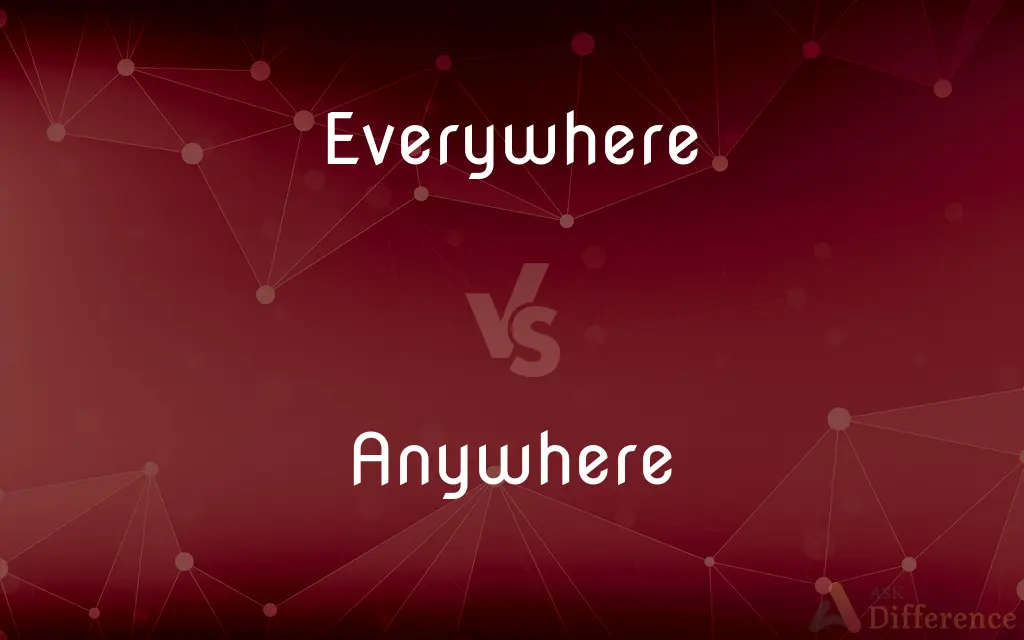Everywhere vs. Anywhere — What's the Difference?
By Tayyaba Rehman & Urooj Arif — Updated on April 5, 2024
Everywhere implies presence in all places simultaneously, focusing on ubiquity. Anywhere suggests potential presence in any place without specificity, emphasizing flexibility.

Difference Between Everywhere and Anywhere
Table of Contents
ADVERTISEMENT
Key Differences
Everywhere refers to being present in all possible locations or situations, suggesting a pervasive or universal presence. Anywhere, on the other hand, denotes a lack of restriction on location or position, offering a sense of choice or variability.
When discussing physical space, "everywhere" conveys a sense of omnipresence, as if something is found in all locations. Meanwhile, "anywhere" indicates that a person or thing could be located in any single place out of many possibilities, without specifying which.
In the context of possibilities or opportunities, everywhere suggests that options or occurrences are widespread, available in all scenarios without exception. On the other hand, anywhere points to the potential for options or occurrences to be selected from a wide range of scenarios, without implying they exist in all.
When used figuratively, "everywhere" can emphasize an overwhelming or inescapable presence of something within a context. Conversely, "anywhere" may highlight the openness or freedom to choose among multiple contexts or scenarios without constraints.
In expressions of availability, "everywhere" suggests something is universally accessible or cannot be avoided. In contrast, "anywhere" implies that access or occurrence is not limited by specific conditions, emphasizing flexibility and openness to location.
ADVERTISEMENT
Comparison Chart
Definition
Present in all locations or situations
Possible in any location or situation
Implication
Ubiquity and omnipresence
Flexibility and lack of specificity
Usage in Sentences
Indicates universal presence or availability
Suggests potential presence without specifics
Contextual Focus
Omnipresence and inescapability
Choice among multiple possibilities
Figurative Meaning
Overwhelming presence across contexts
Openness to various contexts or scenarios
Compare with Definitions
Everywhere
In every direction.
After the explosion, debris was scattered everywhere.
Anywhere
No particular place.
I could live anywhere, as long as it's peaceful.
Everywhere
Common or widespread.
Smartphones are now used everywhere.
Anywhere
Used to indicate choices.
This ticket can take you anywhere you want to go.
Everywhere
Throughout all parts.
The rumor spread everywhere in town.
Anywhere
Without limits or restrictions.
With this app, you can work from anywhere.
Everywhere
In all places or situations.
Stars are visible everywhere at night.
Anywhere
In or to any place.
You can find a good meal anywhere in this city.
Everywhere
Universally present.
The influence of technology is seen everywhere.
Anywhere
Possible in any situation.
With hard work, success can come from anywhere.
Everywhere
In any or every place; in all places. See Usage Note at everyplace.
Anywhere
To, in, or at any place.
Everywhere
In or to all locations under discussion.
He delivers the mail everywhere on this street.
We went everywhere at the school - we talked to all the teachers in their classrooms.
Anywhere
To any extent or degree; at all
The project isn't anywhere near completion.
Everywhere
In or to a few or more locations.
We went to Europe last year and went everywhere: Berlin, Paris, London, and Madrid.
When I shop for shoes, I like to look everywhere.
I've looked everywhere in the house and still can't find my glasses.
Anywhere
Used to indicate limits of variation
Anywhere from 300 to 400 patients suffered secondary infections.
Everywhere
In every place; in all places; hence, in every part; thoroughly; altogether.
Anywhere
Any place whatsoever.
Everywhere
To or in any or all places;
You find fast food stores everywhere
People everywhere are becoming aware of the problem
He carried a gun everywhere he went
Looked all over for a suitable gift
Anywhere
In or at any location or an unknown location.
I don't know where I left my keys. They could be anywhere.
I'd rather be anywhere else.
For many 'home' is an affectation when used anywhere that 'house' would be appropriate, as in 'Home for Sale'.
Anywhere
To in the direction of any location or an unknown location.
Anywhere you go in France, there will be bread and wine with dinner.
I'm staying home today. I'm not going anywhere.
Are you going anywhere special this weekend?
Anywhere
Any location or an unknown location.
Anywhere is better than here!
Anywhere
In any place.
Anywhere
At or in or to any place;
You can find this food anywhere
Common Curiosities
Can "everywhere" and "anywhere" be used interchangeably?
No, because "everywhere" denotes universal presence, and "anywhere" indicates potential presence without specificity.
What does "anywhere" indicate about location?
It suggests that a location or situation can be chosen freely out of many possibilities, without specific constraints.
In what context is "everywhere" more appropriate than "anywhere"?
"Everywhere" is more appropriate when indicating that something is universally present or widespread.
How does "everywhere" express ubiquity?
It denotes something is present in all possible locations or contexts, implying omnipresence.
Is "anywhere" indicative of flexibility?
Yes, it denotes openness and the absence of restrictions on choosing a location or situation.
How do the uses of "everywhere" and "anywhere" differ in literature?
In literature, "everywhere" might be used to create a sense of omnipresence or inescapability, whereas "anywhere" could signify potentiality or the broad scope of settings or outcomes.
Can "everywhere" be used figuratively?
Yes, it can be used to express the idea that something is so common or pervasive that it feels omnipresent.
What is the key difference between "everywhere" and "anywhere"?
"Everywhere" implies presence in all locations or situations, while "anywhere" suggests a potential presence in any location, emphasizing choice or variability.
Can "everywhere" imply a negative context?
Yes, it can suggest an overwhelming or unavoidable presence in a negative sense.
What role do "everywhere" and "anywhere" play in expressions of possibility?
"Everywhere" suggests that possibilities are omnipresent, while "anywhere" indicates that possibilities exist across a range of scenarios without being confined to specific ones.
How do "everywhere" and "anywhere" affect the perception of space and possibility?
"Everywhere" may make space feel filled or saturated with presence or possibilities, while "anywhere" opens up space as a canvas for choice and potentiality.
How do "everywhere" and "anywhere" differ in conveying availability?
"Everywhere" suggests universal availability, while "anywhere" emphasizes potential availability with a choice.
Does "anywhere" imply uncertainty?
It can imply uncertainty in terms of not specifying a particular location, but it also emphasizes freedom and possibility.
Is "anywhere" more optimistic than "everywhere"?
It can be seen as more optimistic, as it suggests freedom, choice, and the potential for positive outcomes in various situations.
What does the preference for using "everywhere" over "anywhere" (or vice versa) reveal about a speaker's perspective?
Preferring "everywhere" might reveal a perspective that emphasizes universality or inescapability, whereas preferring "anywhere" might show an inclination towards freedom, choice, and open-endedness.
Share Your Discovery

Previous Comparison
Fire vs. Water
Next Comparison
Thick vs. LargeAuthor Spotlight
Written by
Tayyaba RehmanTayyaba Rehman is a distinguished writer, currently serving as a primary contributor to askdifference.com. As a researcher in semantics and etymology, Tayyaba's passion for the complexity of languages and their distinctions has found a perfect home on the platform. Tayyaba delves into the intricacies of language, distinguishing between commonly confused words and phrases, thereby providing clarity for readers worldwide.
Co-written by
Urooj ArifUrooj is a skilled content writer at Ask Difference, known for her exceptional ability to simplify complex topics into engaging and informative content. With a passion for research and a flair for clear, concise writing, she consistently delivers articles that resonate with our diverse audience.














































